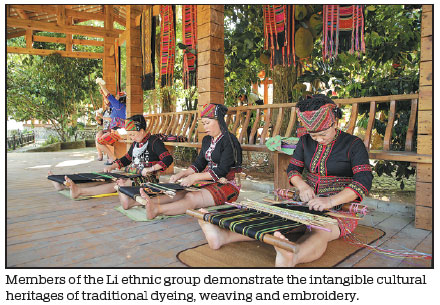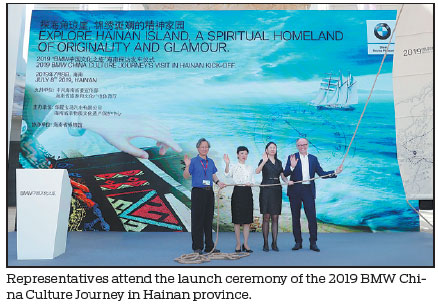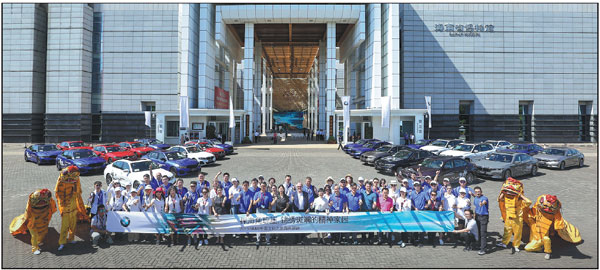Culture journey helps perpetuate valuable intangible cultural heritage
The 2019 BMW China Culture Journey kicked off in Haikou, Hainan province last week to explore the intangible cultural heritage of the province. The German carmaker is making efforts to integrate intangible cultural heritage into modern life.
Built on the theme of "Explore Hainan Island, a Spiritual Homeland of Originality and Glamour," the sixday journey included a visit to Hainan Museum in Haikou city, Tanmen Port in Qionghai city and other sites to learn about the Li and Miao peoples and the unique culture of these ethnic groups.
Johann Wieland, president and CEO of BMW Brilliance Automotive, said at the July 8 kick-off event that the journey in Hainan is special for the German brand because Hans Stuebel, a German ethnologist, visited the island and established an early connection between the Li people in Hainan and the Western society 80 years ago.
"As a premium automotive manufacturer with over a century of history, we've always taken time to look back and review our development path," Wieland said.
"We are a responsible brand that not only evaluates our products and technology but also assesses the value we deliver to society."
This year marks the 13th consecutive year of BMW's commitment to protecting traditional Chinese culture.

The carmaker has innovated to build a sustainable public platform, which connects social resources to better integrate intangible cultural heritage into modern life. The platform has made several achievements in recent years.
In 2016, BMW partnered with Tsinghua University's Academy of Arts and Design to establish an innovation center for intangible cultural heritage safeguarding. From 2016 to 2018, a total of 30 inheritors were selected and trained at the innovation center, focusing on modern design and the creative transformation of intangible cultural heritage items.
Lu Xiaobo, dean of the Academy of Arts and Design at Tsinghua University, said at this year's kick-off event that the Tsinghua BMW Innovation Center for Intangible Cultural Heritage Safeguarding has stepped onto a new stage.
Yang Meihong, vice-president at BMW Brilliance, said the company used to donate money to inheritors but later realized giving money isn't sustainable over the long run.
The training program, which aims to enable inheritors to master relevant skills, is more effective and sustainable. One of the biggest difficulties in inheriting traditional culture is encouraging the young generation to learn the crafts, Yang said.
Some of the crafts are hard and tiring. Intangible cultural heritage rarely appears in modern-day life, because the traditional intangible cultural heritage products have difficulties in meeting people's needs in modern life.
To solve these problems, BMW helps sell the products on their e-commerce platforms, inviting famous artists and designers to work with inheritors to co-design creative intangible cultural heritage products to attract younger customers, Yang said.
In recent years, the Chinese government has rolled out the Revitalization Plan for Traditional Craftsmanship amid efforts to protect intangible cultural heritage and meet needs such as employment and poverty alleviation.
This year, BMW China Culture Journey selected three representative intangible cultural heritage items: traditional dyeing, weaving and embroidery skills of Li ethnic group, coconut carving and dongpo bamboo hat manufacturing skills, and five relevant inheritors in Hainan province to Tsinghua BMW Innovation Center for Intangible Cultural Heritage Safeguarding.
These inheritors, together with professors and students from Tsinghua University's Academy of Arts and Design, will co-design creative intangible cultural heritage products in the next three months.
Such collaboration will help to create more jobs and assist with the implementation of the national policy of Poverty Alleviation through Cultural Means.
To help raise awareness of intangible cultural heritage among China's younger generations, highlights of the journey were shared on the video-sharing site TikTok with the topic of "Fun Intangible Cultural Heritage", encouraging users to share their videos on intangible cultural heritage as a way of promoting China's vast array of valuable and unique examples of culture.
Ning Hongwen, deputy director of the Hainan Provincial Tourism, Culture, Broadcasting and Sports Department, said the province appreciated BMW's contributions in improving the creative transformation of Hainan's intangible cultural heritage.
The program's help in raising awareness among traditional culture lovers to visit Hainan and experience the island's unique marine culture was "truly commendable".
caoyingying@chinadaily.com.cn
|
Delegates of the 2019 BMW China Culture Journey's visit in Hainan pose for a photo before setting off. Photos provided to China Daily |


(China Daily 07/15/2019 page19)















